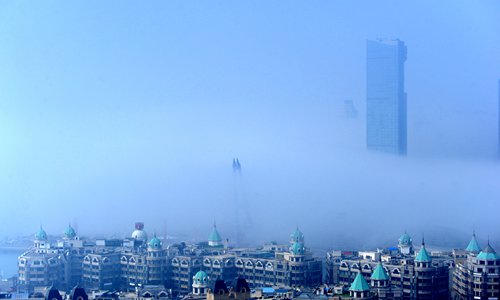Chinese authorities vowed to make those who fake environment data criminally liable, after local officials in seven cities were found to have interfered with the monitoring of air quality stations.

The city of Dalian in Northeast China's Liaoning Province is blanketed by heavy smog on Tuesday. Northern cities across China have witnessed similar poor air quality, with smog alerts being issued. (Photo: VCG)
An inspection conducted by China's environmental authorities from December 2017 to January 2018 shows inspectors found air quality data infected by cannon trucks, dubbed as "magic smog cleaners," according to a statement released on Wednesday by the Ministry of Ecology and Environment.
The statement said they found tampering of air monitors in cities in the provinces of Yunnan, Jiangxi, Hunan, Jiangsu, Hubei, and Guangxi Zhuang Autonomous Region.
Aside from the trucks' influence, seven people broke into a monitor site in the Baiheshan area of Changde, Central China's Hunan Province in January, and two of them sprinkled the device, which interfered with the work of the monitor, the notice said. It did not say whether the seven are government officials.
The ministry said it will continue its inspections and impose harsher penalties on those who manipulate monitoring data, with criminal liability in severe cases.
It also required monitor sites to set up warning signs and ban unauthorized people from approaching the monitors and surrounding areas. Devices that would influence the work of the monitors will be removed and the use of mist cannon trucks will be regulated, the notice said.
In June 2017, a local court sentenced seven people, including the heads of two environmental protection branches, to jail terms of over one year for falsifying air quality monitoring data.
They were convicted of interfering in the data collection of the air quality monitoring system and using cotton to fill the sampling instrument to lower the pollution data, the Xinhua News Agency reported.
"A stricter assessment system puts greater pressure on local environment protection departments and sometimes touches the interests of the leaders, which is the main reason for the illegal behavior," said Wang Gengchen, a research fellow at the Chinese Academy of Sciences' Atmospheric Physics Institute.
"It is important to involve the public and research institutes in supervision work. The locations of monitors, for example, should be made public so that people can observe and tip off authorities when illegal behavior occurs," Wang told the Global Times.


